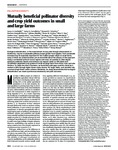Use este identificador para citar ou linkar para este item:
http://www.alice.cnptia.embrapa.br/alice/handle/doc/1035104| Título: | Mutually beneficial pollinator diversity and crop yield outcomes in small and large farms. |
| Autoria: | GARIBALDI, L. A.  CARVALHEIRO, L. G.   VAISSIÈRE, B. E.   GEMMILL-HERREN, B.   HIPÓLITO, J.   FREITAS, B. M.   NGO, H. T.   AZZU, N.   SÁEZ, A.   ASTROM, J.   AN, J.   BLOCHTEIN, B.   BUCHORI, D.   CHAMORRO GARCÍA, F. J.   SILVA, F. O. da   DEVKOTA, K.   RIBEIRO, M. de F.   FREITAS, L.   GAGLIANONE, M. C.   GOSS, M.   IRSHAD, M.   KASINA, M.   PACHECO FILHO, A. J. S.   KIILL, L. H. P.   KWAPONG, P.   NATES PARRA, G.   PIRES, C. S. S.   PIRES, V.   RAWAL, R. S.   RIZALI, A.   SARAIVA, A. M.   VELDTMAN, R.   VIANA, B. F.   WITTER, S.   ZHAN, H.   |
| Afiliação: | LUCAS A. GARIBALDI, Instituto de Investigaciones en Recursos Naturales; LUÍSA G. CARVALHEIRO, UnB; BERNARD E. VAISSIÈRE, Institut national de la recherche agronomique; BARBARA GEMMILL-HERREN, FAO; JULIANA HIPÓLITO, Universidade Federal da Bahia; BRENO M. FREITAS, Universidade Federal do Ceará; HIEN T. NGO, Intergovernmental Platform on Biodiversity and Ecosystem Services (IPBES); NADINE AZZU, FAO; AGUSTÍN SÁEZ, Universidad Nacional del Comahue-CONICET; JENS ASTROM, Norwegian Institute for Nature Research; JIANDONG AN, Institute of Apicultural Research, Chinese Academy of Agricultural Sciences; BETINA BLOCHTEIN, Pontifícia Universidade Católica do Rio Grande do Sul (PUCRS); DAMAYANTI BUCHORI, Department of Plant Protection, Faculty of Agriculture, Bogor Agricultural University; FERMÍN J. CHAMORRO GARCÍA, Universidad Nacional de Colombia; FABIANA OLIVEIRA DA SILVA, Universidade Federal de Sergipe; KEDAR DEVKOTA, Institute of Agriculture and Animal Science; MARCIA DE FATIMA RIBEIRO, CPATSA; LEANDRO FREITAS, Jardim Botânico do Rio de Janeiro (JBRJ); MARIA C. GAGLIANONE, Laboratório de Ciências Ambientais, Universidade Estadual do Norte Fluminense Darcy Ribeiro; MARIA GOSS, University of Zimbabwe, Faculty of Agriculture, Crop Science Department; MOHAMMAD IRSHAD, Conservation and Management of Pollinators for Sustainable Agriculture through Ecosystem Approach project; MUO KASINA, Agricultural and Livestock Research Organisation-Sericulture; ALÍPIO J. S. PACHECO FILHO, Universidade Federal do Ceará; LUCIA HELENA PIEDADE KIILL, CPATSA; PETER KWAPONG, College of Agriculture and Natural Sciences, School of Biological Sciences, University of Cape Coast; GUIOMAR NATES PARRA, Universidad Nacional de Colombia; CARMEN SILVIA SOARES PIRES, CENARGEN; VIVIANE PIRES, Instituto do Meio Ambiente e Recursos Hídricos; RANBEER S. RAWAL, G.B. Pant Institute of Himalayan Environment and Development, Kosi-Katarmal; AKHMAD RIZALI, Department of Plant Pest Diseases, Faculty of Agriculture, University of Brawijaya; ANTONIO M. SARAIVA, Universidade de São Paulo, Escola Politécnica; RUAN VELDTMAN, South African National Biodiversity Institute, Kirstenbosch Research Centre; BLANDINA F. VIANA, Universidade Federal da Bahia; SIDIA WITTER, Centro de Pesquisa Emílio Schenk, Fundação Estadual de Pesquisa Agropecuária; HONG ZHAN, Institute of Apicultural Research, Chinese Academy of Agricultural Sciences. |
| Ano de publicação: | 2016 |
| Referência: | Science, v. 351, n. 6271, p. 388-391, 2016. |
| Conteúdo: | Ecological intensification, or the improvement of crop yield through enhancement of biodiversity, may be a sustainable pathway toward greater food supplies. Such sustainable increases may be especially important for the 2 billion people reliant on small farms, many of which are undernourished, yet we know little about the efficacy of this approach. Using a coordinated protocol across regions and crops, we quantify to what degree enhancing pollinator density and richness can improve yields on 344 fields from 33 pollinator-dependent crop systems in small and large farms from Africa, Asia, and Latin America. For fields less than 2 hectares, we found that yield gaps could be closed by a median of 24% through higher flower-visitor density. For larger fields, such benefits only occurred at high flower-visitor richness. Worldwide, our study demonstrates that ecological intensification can create synchronous biodiversity and yield outcomes. |
| Thesagro: | Polinização Biodiversidade |
| Palavras-chave: | Visitantes florais Grande fazenda Pequena fazenda Pollinator diversity |
| ISSN: | 1095-9203 |
| Digital Object Identifier: | 10.1126/science.aac7287 |
| Tipo do material: | Artigo de periódico |
| Acesso: | openAccess |
| Aparece nas coleções: | Artigo em periódico indexado (CPATSA)  |
Arquivos associados a este item:
| Arquivo | Descrição | Tamanho | Formato | |
|---|---|---|---|---|
| Kiill2016.pdf | 455,71 kB | Adobe PDF |  Visualizar/Abrir |









